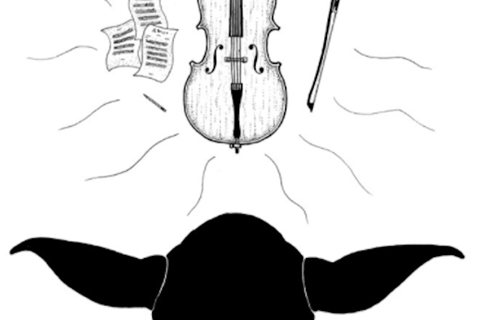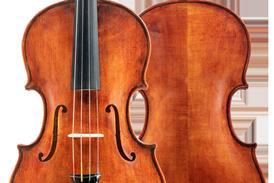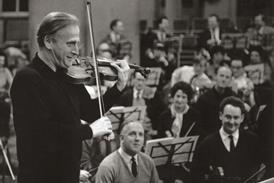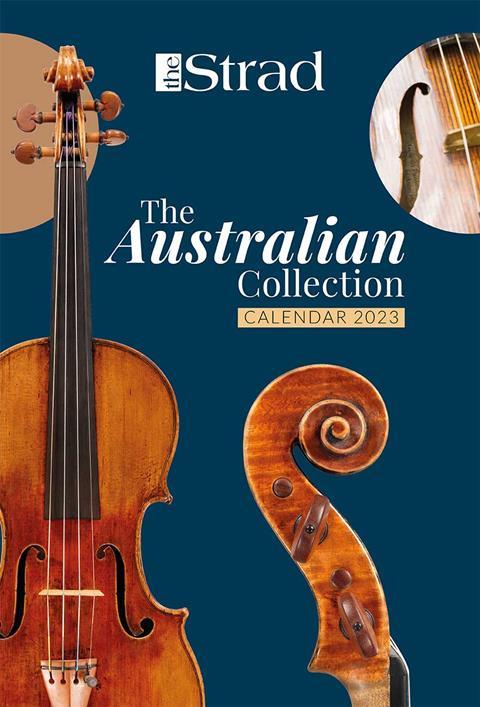In the second of his articles, mining the wisdom of the Star Wars universe, cellist Brian Hodges explains how the teachings of the Jedi can be applied to string playing

Discover more Featured Stories like this in The Strad Playing Hub
Throughout the various stories that make up Star Wars, the Jedi have been constant sources of insight and wisdom. Not surprisingly, many of the teachings can be applied to life in our galaxy, particularly in regards to string playing. The following are a few that can be very useful:
‘Your focus determines your reality’– Qui-Gon Jinn
This can have many applications, but the one that resonates with most players is in the context of a performance. It’s not uncommon to be a ball of anxiety about performing, which can often manifest itself in shaking, clammy hands, racing heart rate, and an increase in breathing. When this happens, your mind tends to hone in and fixate on the fact that you are nervous, pushing expressive aspects of performance to the background. The fact that you’re nervous is what is occupying your forethoughts, rather than the business at hand, which is making music.
Training yourself to change your focus in performance can help enormously. It’s not that you won’t get nervous necessarily, but it won’t be the mental element you are grabbing for immediately. Rather, ask yourself: ‘What do you want to say with this piece?’, ‘What do you want the audience to experience and walk away with?’, ‘What does the composer want to impart in writing this piece?’ Writing some of these answers down on your music can help give you something concrete to hold onto, bringing your thoughts back down to earth when your mind starts to veer into panicked territory.
The point is that you have more control over your supposed errant thoughts than you realise. Harnessing your mind, bringing your focus into the main objective of the performance can be done through practice, and can make the difference in how you feel when you perform.
‘Be mindful of your thoughts, they betray you’– Obi-Wan Kenobi
As many of us have experienced, we can be our own worst critic regarding our playing. I doubt many critics would ever dare to say, or even think, some of the things I’ve thought about my own playing. I’ve often heard of teachers warning against writing your review while you’re playing, and it’s true, it doesn’t help in the slightest. Those thoughts that seem to come from the deepest, darkest places in our soul, suddenly make themselves known in the most inopportune moments, undermining all of the hard work that you’ve done.
Even in the practice room, these critical voices can be a monolithic mental stumbling block. Having a fatalistic attitude toward a thorny passage in the piece you’re working on can cause you to continually miss it, creating a self-fulfilling prophecy of sorts.
In any scenario of your playing, keeping positive energy flowing through you as you play will make you a much more effective musician. You might even look forward to performing! Every performer has moments of self-doubt, some to the point of crippling negativity, but again, with practice, stopping those thoughts in their tracks, deflecting them with positive self-affirmation will improve your overall health as a performer.
‘In my experience, there’s no such thing as luck’– Obi-Wan Kenobi
From time to time, I will work on a particular passage with a student in a lesson, going through it with them a number of times. There might be a substantial shift involved, which maybe they nail three out of the six times we go through it. When this happens, it seems to me that the student might be coasting on a bit of luck.
Many factors likely contribute to this, from using a different fingering each time, to just not practicing it in an organized and secure way. One of the more important factors in solidifying their technique that I try to impart to students is consistency. I stress that they need to commit to a specific fingering and bowing, and use them every single time they practice a shift. Replicating the correct way of executing the shift each and every time will ensure the success of the shift when it’s needed in performance.
There’s a line of thinking in some players that committing to a single fingering or bowing takes the romance and excitement out of playing. While I don’t discount that it can work for some players who thrive on the knife’s edge of danger, most players need more concrete details in their playing. There’s enough to worry about without having to make up a fingering on the fly. To be frank, audiences won’t notice any difference, and you can have the confidence in your performance that luck won’t provide.
No matter what issues you face in your playing, know that wisdom from the Jedi can be applicable to string playing no matter what galaxy you come from. May the Force be with you and your playing.
Read: Opinion: The Wisdom of Yoda
Read: John Williams at 90: Anne-Sophie Mutter’s ‘respect for this gigantic musician’
Read more Featured Stories like this in The Strad Playing Hub
The number one source for playing and teaching books, guides, CDs, calendars and back issues of the magazine.
In The Best of Technique you’ll discover the top playing tips of the world’s leading string players and teachers. It’s packed full of exercises for students, plus examples from the standard repertoire to show you how to integrate the technique into your playing.
The Strad’s Masterclass series brings together the finest string players with some of the greatest string works ever written. Always one of our most popular sections, Masterclass has been an invaluable aid to aspiring soloists, chamber musicians and string teachers since the 1990s.
This year’s calendar celebrates the top instruments played by members of the Australian Chamber Orchestra, Melbourne Symphony, Australian String Quartet and some of the country’s greatest soloists.






































No comments yet